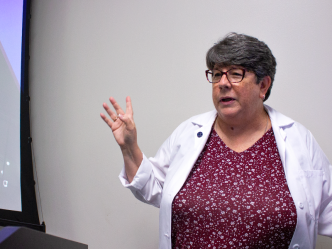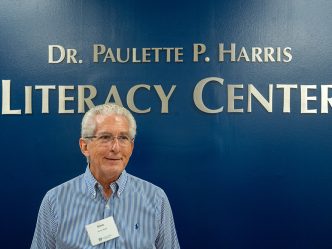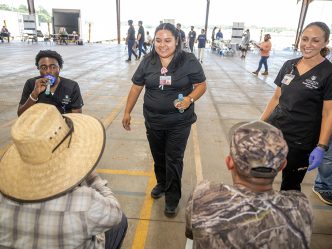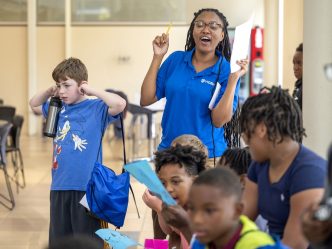After serving 15 years as dean of the College of Nursing at Augusta University, Dr. Lucy Marion looks back at her more than 50-year career in nursing as she plans to retire later this year
To say that Dr. Lucy Marion, the dean of the College of Nursing at Augusta University for the past 15 years, is going to retire this coming fall is a little misleading.
Anyone who has ever met Marion knows that she’s not one to completely walk away from her true love: nursing.
“I have been a nurse for 52 years and I have been in academe for 51 years,” Marion said. “While I did stop for a little bit to have babies, I have kept my hand in nursing and academe the entire time by publishing, trying out innovative nursing roles and trying to change parental visiting rules in military hospitals. Even when I went back to school, I’d teach to support my education.”
After dedicating her last 15 years to advancing nursing education in Georgia and beyond, Marion said she expects to return to national arena of educational standards for nursing and health care after retiring from Augusta University. And, of course remain active promoting health in Augusta and Georgia.
However, her official retirement date will be a little later than she expected. Marion has agreed to delay her retirement a few more months as the College of Nursing continues to search for a new dean.
“I was supposed to retire on June 30,” Marion said, smiling. “That’s what my official resignation letter stated, but I’ve agreed to stay a little longer while they’re still looking for a new dean. Right now, my retirement date is Oct. 31.”
But stepping away from her role as dean will not be easy, Marion said.
“This job, as a nursing faculty member, is the best job in the world,” she said. “I have enjoyed every day of it. Don’t get me wrong. It’s hard. There’s nothing harder than balancing the art and science of nursing, education, health policy and serious leadership. It takes total commitment. But if you’re that kind of person who sees possibilities, like I do, the sky is the limit.”
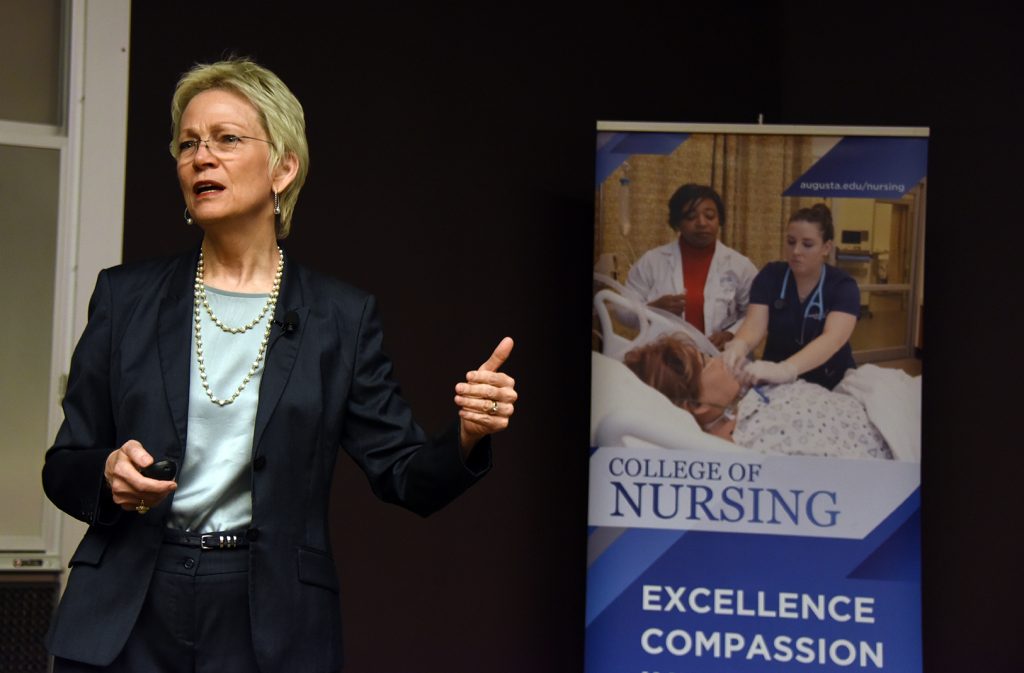

Over the years, Marion has been offered several other positions across the country, but she has been devoted to Augusta University and its role to promote nursing education throughout the state of Georgia.
“I’ve been asked to consider other roles in academe, supposedly moving up and out of nursing. But I feel like I’m already there with the nursing deanship,” Marion said. “It’s funny. I didn’t know that I wanted to be in administration when I stumbled into my first experience, but becoming dean was a natural evolution for me. To this day, I stay totally engaged in 80-hour work weeks and likely will until I walk out the door the final time.”
While it will be difficult letting go of her role at Augusta University, Marion believes she is leaving the College of Nursing in good hands.
“We have a great leadership team, and they will continue to lead with confidence and competence,” Marion said. “In fact, over these past 15 years, the College of Nursing faculty has set trends for several types and levels of educational programs, definitely for the state and some for the nation as well.”
When the Doctor of Nursing Practice (DNP) program was launched in the summer of 2005 at Augusta University (then known as the Medical College of Georgia), it was the only one in Georgia and one of 10 in the nation, Marion said.
“We saw an opportunity and decided that the DNP was the way of the future,” Marion said, explaining this doctoral-level education provides nurses with advanced clinical and management expertise to vastly improve health care. “I actually wrote one of the first DNP articles called, ‘DNP: Future or Fringe?’ That was in 2003 and we had only four programs in the United States at the time. Now, the country has more than 380 programs, so our vision here was ahead of the curve and on target. ”
Over the past two decades, the country was facing a rapidly changing health care environment due to health care discoveries, seminal publications related to quality and safety, aging population, a nationwide shortage of primary care physicians and limits to resident physician hours.
As a result, nurse practitioners and other advanced practice nurses were enlisted to fill the gaps, providing primary and acute care, and ensuring complex care coordination and evidence-based patient education, Marion said.
A handful of institutions, including Columbia University and University of South Carolina, were already responding to these changes with their own version of a DNP program. Marion immediately reached out to those programs and closely followed their developments.
“So, I didn’t create it,” Marion said, “but I saw it on the horizon.”
Partners in the DNP program
By the time Marion was offered the position as dean of the College of Nursing in 2004, she made the creation of a DNP program a prerequisite of her accepting the job.
“Frankly, I wouldn’t sign on the line until a DNP program was in the offer letter from the provost,” Marion said, laughing. “And the provost was true to his word and supported it at all levels.”
The first class was made up entirely of 14 masters-level early innovator nursing faculty members from Augusta University, she said.
“There were 14 of them in all and 11 of them graduated and remained on faculty for at least two years as promised,” Marion said. “As that first test class, they helped clean up the program and provided us guidance for the future.”
But Marion wasn’t just satisfied with bringing the DNP program to Augusta University.
“Our next step was to take the program to all of the interested University System of Georgia campuses,” she said. “So, we had nine different campuses that we were partnering with at one time, including USG schools such as Albany State, Columbus State, and Clayton State, and external schools such as Vanderbilt University. We also partnered with an institution in Puerto Rico because they didn’t have any access to a DNP program, so they asked us if we would take it there.”
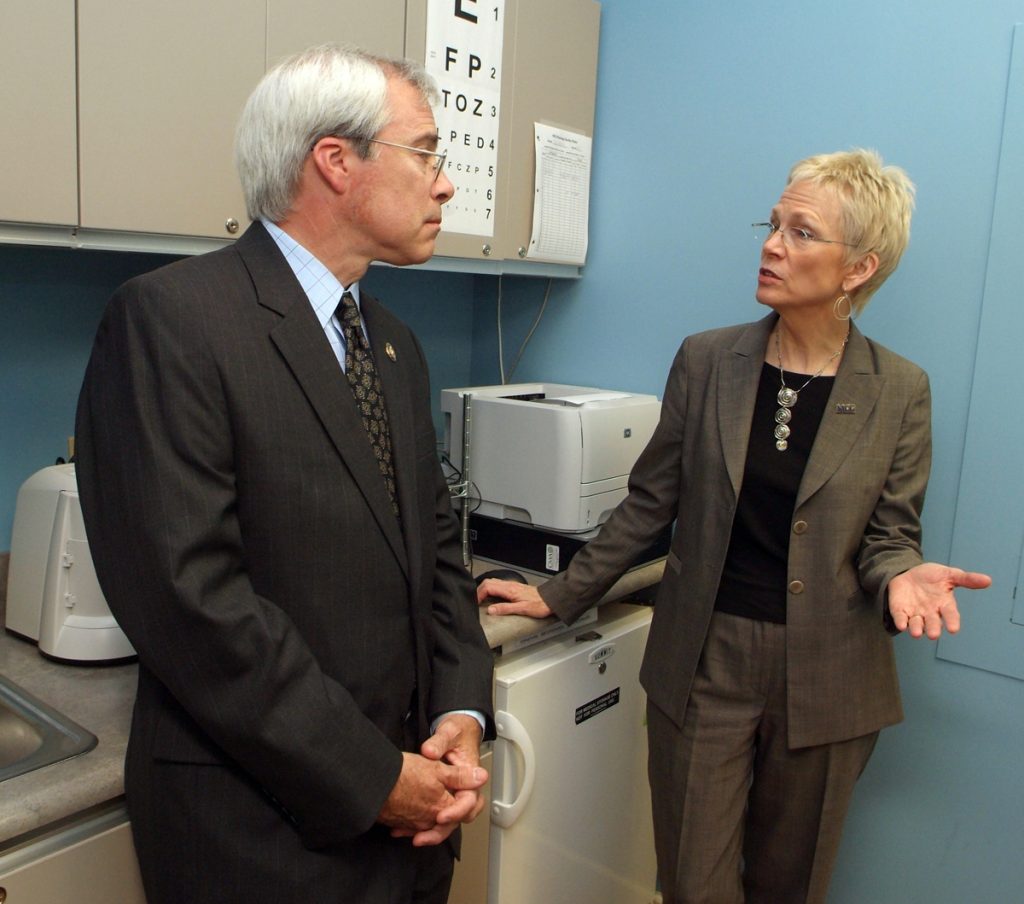

Augusta University prepared the nursing faculty members from partner universities with the new terminal degree and then our faculty helped some to launch their own doctoral programs.
“That’s how we changed things,” Marion said. “Our College of Nursing took a financial hit because, of course, few of our first students paid tuition. Nevertheless, the university covered the costs in our mission to graduate as many doctorally educated nurses as possible for the state.”
Fortunately, Marion and her enterprising faculty received funding from a few different sources: One partnership grant from the Robert W. Woodruff Foundation provided Augusta University with $1 million and Emory University Nell Hodgson School of Nursing with $500,000 — both to increase the number of nurses with practice doctorates.
As a result of her efforts, Marion is now known as a pioneer in nurse practitioner faculty practice and has been recognized over the years by The Journal for Nurse Practitioners for helping develop the nurse practitioner role throughout the country.
Just last year, Marion was awarded the American Association of Nurse Practitioners’ 2018 Nurse Practitioner State Award for Excellence.
According to the AANP, the award is given annually to a dedicated nurse practitioner advocate in each state, who has made a significant contribution toward increasing the awareness and recognition of nurse practitioners.
“Eventually, all of it came together,” Marion said, adding that the DNP program at Augusta University now includes seven tracks for post-bachelor of science degrees in nursing and post-master’s degrees in nursing.
The program doubles the number of clinical hours for advanced practice nurses and provides for practice improvement projects, she said.
“It was the need for more complex care for people living with comorbid conditions, availability of capable community and hospital nurses and a shortage of physicians that drove this movement,” Marion said. “In the end, we are able to make a big impact.”
The future of compassionate coordinated care
Less than two weeks ago, Marion fulfilled another vision for the College of Nursing that she has held for about 15 years and indeed was envisioned even before she arrived.
With Augusta University President Dr. Brooks Keel by her side, Marion officially opened the college’s new nurse-managed health center located in the university’s Health Sciences building. It is the only clinic of its kind in the state to reside in an academic setting.
The center offers same-day and walk-in appointments for primary care services related to acute and chronic disease management, annual wellness exams and sports physicals. Additionally, patients can take advantage of in-center lab services, including tests for blood sugar, influenza A/B, strep, urinalysis and urine pregnancy.
“We made the decision to design a new Nurse-Managed Health Center in the clinical space downstairs in the Health Sciences building, and it is owned and operated by the College of Nursing,” Marion said. “This is ours. We decide who will work for us and they are all going to have DNP degrees or working on one, so we will showcase DNP care with primary care RNs as partners in care. We also have a remarkably able and forward-thinking MCG physician who serves as our physician collaborator. With this team, we can address complex health care needs that require advanced nursing care—compassionate and coordinated.”
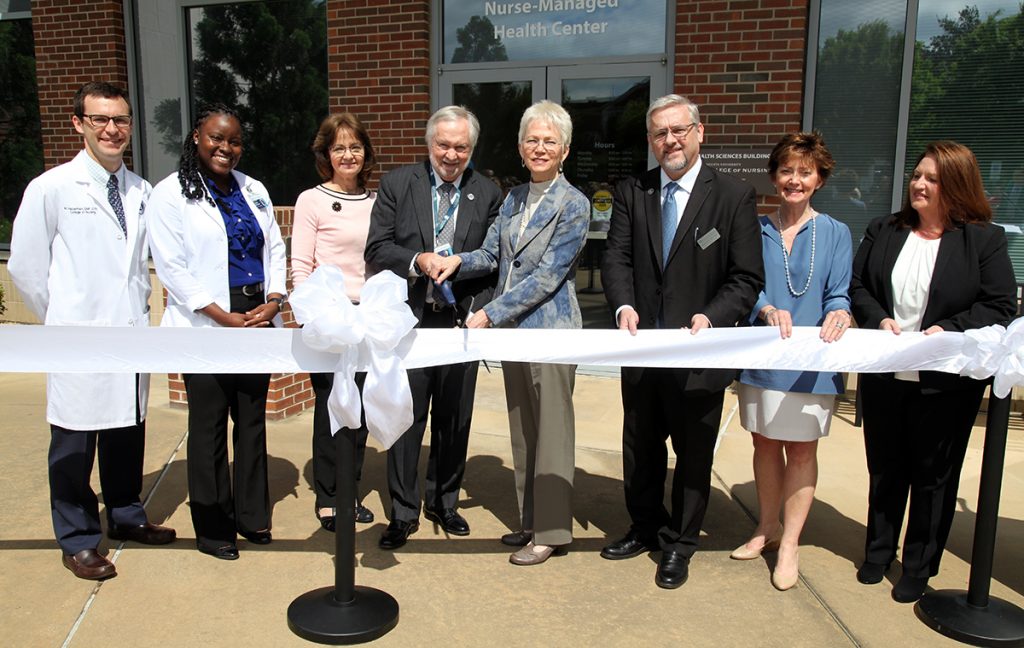

While such initiatives sometimes take longer to come to fruition than Marion would like, she is extremely proud to see the progress the College of Nursing has made over the past 15 years.
For example, as dean, Marion personally supported the creation of the Greater Augusta Healthcare Network (GAHN) which was established in 2007 to address the tremendous need for quality, affordable health care in Augusta and the surrounding communities.
With initial funding from the Healthcare Georgia Foundation, the College of Nursing spearheaded the GAHN initiative in collaboration with key community health care stakeholders with the goal of creating a seamless health care system for residents, Marion said.
“The Greater Augusta Healthcare Network, to this day, is the only safety net organization for health care in the greater Augusta area,” Marion said, adding its members include hospitals, faith-based community clinics, the East Central Health District, and eight community service agencies. “Now, a 501(c)(3), GAHN members and College of Nursing faculty and students enjoy mutually beneficial relationships. My supportive role is my personal community service.”
With such a personal attachment to a project like GAHN, Marion knows that it will be painful to separate herself from that mission.
“It’s going to be hard to let go,” Marion said, with a deep sigh. “Fortunately, I have faculty members to take it on leadership. However, I would love for the new dean to take this on in some fashion.”
“Two Georgias: Atlanta and the rest”
As an award-winning NIH-funded health behavior change researcher, Marion has always focused on caring for high-risk populations due to factors such as poverty, homelessness and abuse.
“Nursing is a community-oriented and social justice-based profession,” Marion said. “Social justice is our underlying drive and it undergirds all of our standards. And we know in this state that we have two Georgias: Atlanta and the rest. Nurses have always worked with the underserved to provide them the care they deserve, regardless of the rural-urban divide. The college has to its credit many service and training grants to geared to vulnerable populations.”
Being raised in the small town of Scotland, Georgia, as a child, Marion said she learned from a very early age the value of every human being in a community.
“I had a tough childhood, which fits with caregivers in general,” Marion said, explaining that her mother died from Hodgkin’s disease when she was 11 years old. “So, from the ages of 9 to 11, I was somewhat of a caregiver, taking care of the younger children with my older sister. But my mom was still a mother. She did not role reverse. In fact, she was a teacher and taught until December and died in January. She was working hard to stay alive.”
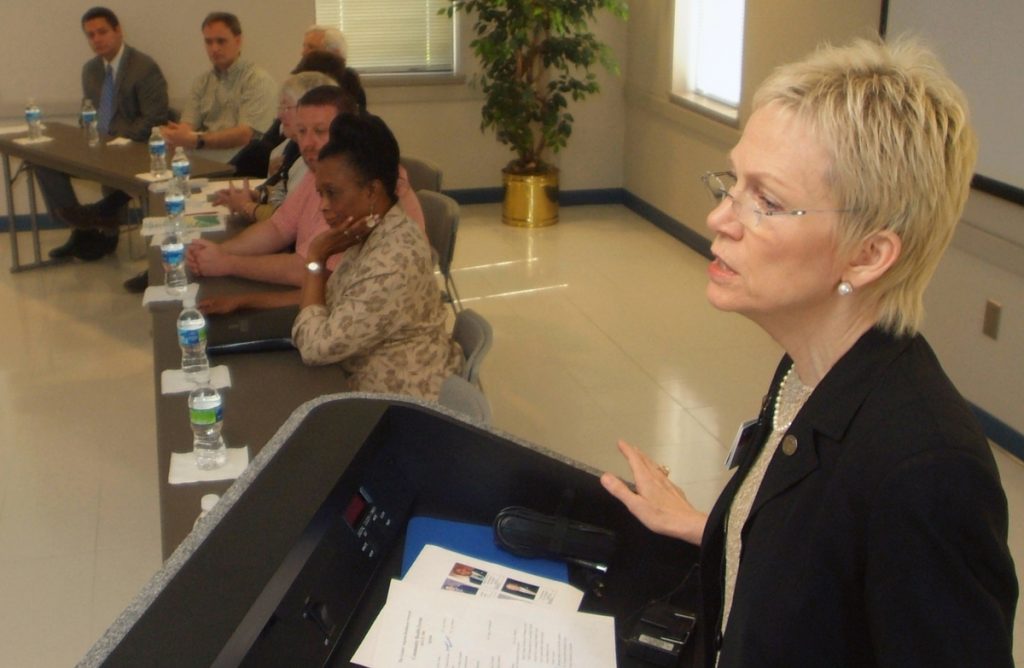

After her mother passed away, Marion and siblings were taken in by her mother’s family in a tiny town with a population of about 300 people.
“The only piece of recreation in the entire town was a basketball hoop, with not even a net on it, out in the middle of a field,” Marion said. “There was no library and no school. There was just a country store with a gas pump, a liquor store and a post office. And the infamous creek ‘whirl hole,’ which thankfully was deep enough for swimming. That was about it.”
There were few teens in town, but they knew and cared deeply for one another, she said.
During the summer days, Marion worked the fields picking vegetables under the hot Georgia sun, surrounded by biting bugs and irritating okra. The fear was running into snakes, especially with no adults around.
“In my environment, I learned to work hard to move to my next stop: college,” she said. “One inspiring force in my life was my teacher grandmother. She wanted me to be a nurse. Actually, she wanted to be a nurse, but nice girls didn’t become nurses when she was younger. I was named after her.”
Looking back on those days, Marion said she learned that hard work paid off.
“Sustained work is not a problem for me. I enjoy it,” Marion said. “And for more than 50 years, I’ve been doing what I love. There are not too many people as lucky as I am.”
Read Dr. Lucy Marion’s paper, “The Practice Doctorate in Nursing: Future or Fringe?”
You can create boundless opportunities for our AU Nurses by investing in furthering their education. Every gift has a direct and immediate impact on educating generations of AU nursing professionals who take care of our patients every day. Please visit Augusta University’s Nurses Week website to give and commit to helping promote excellence in nursing education and building a strong nursing workforce.
 Augusta University
Augusta University

